Can chickens eat blackberries? Yes, they can! They are an excellent source of essential vitamins, minerals, and fiber. Blackberries are packed with antioxidants and contain lutein, which can help improve eye health. They are also high in vitamins A and C, potassium, and iron.
Chickens should not be given large amounts of blackberries because they contain natural sugar and can cause digestive problems if consumed in excess. However, small amounts of blackberries can be given to chickens as a snack or as part of their daily diet.
Let’s take a closer look at how these delicious fruits can benefit your birds.
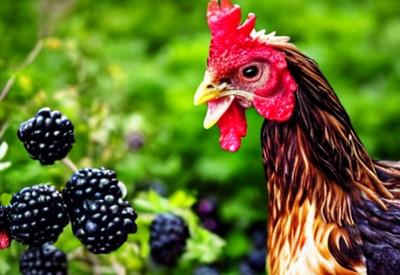
Can chickens eat blackberries?
Are you looking for a way to improve your chicken’s diet Blackberries could be the answer! Blackberries are safe for chickens and easy to digest.
Not only are they packed with antioxidants that promote good health, but they also provide a range of essential vitamins and minerals. These include vitamin C, Vitamin K, magnesium, iron, and calcium. They also contain dietary fiber, which is important for a healthy digestive system.
It’s important to note that blackberries are high in natural sugar, so you should only give your chickens a small amount as part of their daily diet. Too much sugar can cause digestive issues, so it’s best to give them a small handful of blackberries as an occasional snack.
[ChickenAffiliate]
The benefits of eating blackberries for chickens
We all want to keep our feathered friends happy, healthy, and well-fed. The key to a balanced diet for chickens is variety, and blackberries are an excellent way to provide your chickens with the important nutrients they need. Let’s explore the five main benefits of feeding blackberries to your chickens.
Vitamins & Minerals
Blackberries are full of vitamins and minerals such as vitamins C, K, E, magnesium, and potassium, which help promote healthy feathers and bones in chickens. They contain antioxidants that can help boost their immunity against disease and infection.
Digestive Health
Eating blackberries helps improve a chicken’s digestion by providing dietary fiber, which helps move waste through their bodies quickly and efficiently. This keeps the digestive system running smoothly and ensures the birds get the most out of their food.
Egg Quality
The nutrient-rich blackberry also helps increase egg quality in chickens because it contains important vitamins like B-12 which can help improve eggshell strength and coloration in hens.
Protein Content
Blackberries contain a good amount of protein which helps chickens grow stronger bones, muscles, feathers, organs, and skin cells. In addition, protein is essential for healthy egg production in hens, so they must get enough from their diet.
Digestible Carbohydrates
Lastly, blackberries also contain carbohydrates that are easily digested by chickens which further aids in digestion as well as provides them with energy throughout the day for activities like foraging or laying eggs!
Things to watch out for when feeding blackberries to chickens
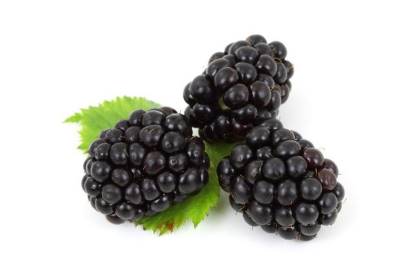
As with any food item, it’s important to keep a few things in mind when feeding your chickens blackberries. Let’s look at what you need to know if you share this juicy fruit with your feathered friends.
Limit the Amount
Blackberries are full of nutrition but should only be fed to your chickens occasionally because they contain sugar and carbohydrates, which can cause health issues if eaten excessively.
It’s best to limit the number of blackberries you feed your chickens daily – a handful or two should be more than enough for most flocks.
Don’t Overripen the Berries
Overripe blackberries can cause digestive issues for your birds as their systems aren’t well-equipped to process overripe fruits and vegetables. Before serving them up, inspect the berries for mold or other signs of decay, and discard any that don’t look fresh and healthy.
This is also important for prevention against parasites like salmonella, E-coli, and listeria, which can all be found on overripe fruits and vegetables.
Watch Out for Pesticides
As with any food item you feed your chickens, it’s important to ensure no pesticides or other chemicals are used on the blackberries before feeding them. Organic, locally-grown berries are always the best option if you can find them!
How often should chickens eat blackberries?
When it comes to feeding chickens blackberries, moderation is key. They should only receive a handful of berries at a time – daily or weekly – and no more than 10% of their diet should consist of blackberries.
This is important because too many blackberries can cause digestive discomfort and even impair the bird’s health in the long term. Furthermore, supplementing chickens’ diets with other foods like leafy greens, mealworms, and corn will provide them with more nutrients and help keep them strong and healthy.
How to prepare blackberries for feeding to chickens
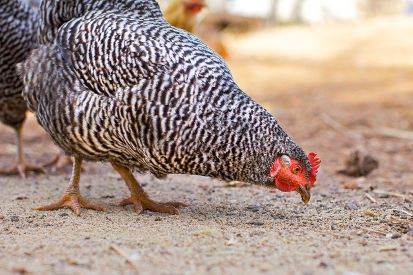
Blackberries are packed with vitamins and minerals that provide important health benefits for your birds. Plus, they love them! Here are some tips on how to best prepare blackberries for your chickens.
Wash First
Before giving blackberries to your chickens, make sure that you wash them thoroughly. This will help remove any dirt or bacteria on the fruit that could make your chickens sick.
It’s also a good idea to double-check the berries for any signs of mold or rot before feeding them.
No Need To Cut Up
Blackberries don’t need to be cut up into smaller pieces before feeding them to your chickens. The birds can easily consume the entire berry without needing extra preparation beforehand.
However, it is important not to feed them too many at once as this could cause digestive issues in the birds.
No Need To Remove The Seeds
Contrary to popular belief, removing the seeds from blackberries is unnecessary before feeding them to your chickens. Many believe the seeds contain beneficial nutrients that may help with egg production.
So don’t worry about removing any pesky little seeds – your birds will be fine eating them as is.
No More Than 10% Of Their Diet
While blackberries are a great treat for your chickens, it’s important not to overdo it with these delicious fruits. Make sure that they only account for no more than 10% of their total diet.
Otherwise, you’ll put too much strain on their digestive system, potentially causing other health problems.
Remove Any Uneaten Berries
After feeding blackberries to your chickens, check their coop regularly throughout the day, and remove any uneaten berries that might have been left behind.
This will help keep away pests like rats and mice, which could potentially carry diseases into their living space if given access.
Can baby chicks eat blackberries?
It is generally safe to feed blackberries to baby chicks, but it’s important to remember to do so in moderation. Chicks shouldn’t receive whole fruits until they are at least a few weeks old, as some fruits can be difficult to digest.
When introducing blackberries and other treats, start small and watch your chicks for any signs of reaction or difficulty. If your chicks seem to enjoy the treat, gradually increase how much you offer with each successive meal.
Additionally, balanced nutrition must be maintained while providing special treats like blackberries – if not, it can lead to malnutrition or digestive upset in baby chicks.
Can chickens eat blackberry seeds?
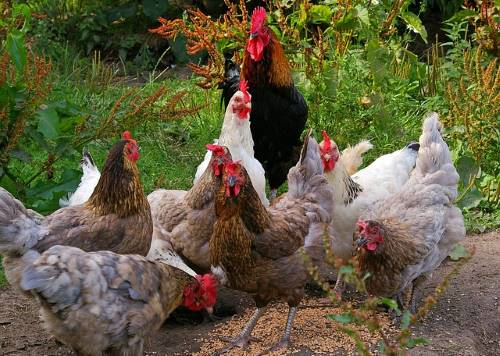
The answer to the question of whether chickens can eat blackberry seeds is yes! Although some foods may have to have their seeds removed before feeding them to chickens, blackberry seeds are completely safe for a chicken’s diet.
The soft shells of the blackberries are packed with nutrition and flavor that will benefit the health of your flock, so there is no need to remove the seeds before serving them up as part of an occasional treat.
Can chickens eat blackberry leaves?
While it is generally considered safe to feed chickens blackberry leaves, there are certain precautions one should take before offering the leaves as a treat. As with all fresh produce, check for pesticides or other chemicals that may have been applied, potentially posing a health risk for your birds.
Additionally, look for any thorns on the blackberry bushes, which could become stuck in your chickens’ throats or intestines and cause injury. With these considerations in mind, you can safely add blackberry leaves to your chicken’s diet.
Can chickens eat blackberry jam?
Many people may be wondering if chickens can eat blackberry jam. Although chickens like sweet things and may enjoy pecking at the jam, it is best not to give them food that contains too much sugar.
While a small amount of sugar may not hurt your chickens, indulging them with excessive sweetness can lead to serious nutritional deficiencies and other health problems.
Therefore, it is typically recommended that you avoid giving your chickens blackberry jam (or any jam) and stick with providing them with healthy treats instead.
What other berries can chickens eat?
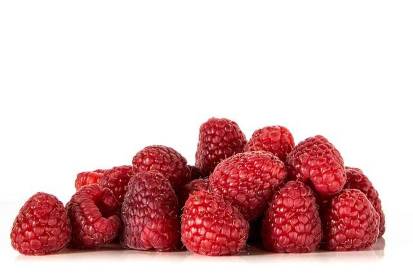
Now you know that chickens love to eat blackberries. But did you know that blackberries are not the only type of berry that chickens can enjoy? Let’s explore some other berries that your chickens may enjoy munching on.
Strawberries
Strawberries are a great source of vitamins and minerals for your chickens. A single strawberry contains vitamin C, potassium, manganese, dietary fiber, magnesium, folic acid, and phosphorus – all essential nutrients for your feathered friends.
Plus, they have a sweet and juicy flavor that chickens love! Just be sure to remove the leaves and stems before giving them to your chickens, as these can cause digestive issues.
Read More: Can Chickens Eat Strawberries? 6 Excellent Benefits
Blueberries
Blueberries are packed with antioxidants and full of nutrition. They are rich in zinc, iron, and phosphorus, all important minerals for poultry health. Blueberries contain high levels of Vitamin A, which helps boost immunity in chicks.
As a bonus, blueberries are low in sugar compared to other berries, so they won’t cause a spike in blood sugar levels like some sweeter fruits can.
Read More: Can Chickens Eat Blueberries? 5 Important Benefits
Cranberries
Cranberries are an excellent treat for chickens because they contain numerous vitamins and minerals such as calcium, magnesium, and Vitamin C. They also have anti-inflammatory properties, which help keep your chicken’s digestive system running smoothly.
Cranberries also contain high levels of antioxidants which help maintain optimal egg production in hens. Make sure you give them the fresh cranberry variety instead of dried cranberry snacks, as those tend to have added sugars.
Read More: Can Chickens Eat Cranberries? 6 Amazing Benefits
Raspberries
Raspberries are full of nutrition for your flock. They contain Vitamin C, magnesium, phosphorus, copper, and manganese, all essential vitamins and minerals for healthy chickens. Raspberries also offer high levels of dietary fiber, which helps promote good digestion in poultry.
Additionally, raspberries contain significantly less sugar than other berries, meaning they won’t have the same effect on blood sugar levels as sweeter fruits.
Read More: Can Chickens Eat Raspberries? 5 Awesome Benefits
Mulberries
Mulberries are a great source of nutrition for your chickens. They provide high levels of Vitamin C and important minerals such as iron and copper, which help keep poultry healthy and strong. Mulberries also offer antioxidant benefits, which can help boost egg production in hens while reducing the risk of infection or disease from free radicals.
Lastly, mulberry leaves make a great snack for chickens too – make sure you pick off any pests before offering them up.
Read More: Can Chickens Eat Mulberries? 6 Excellent Benefits
How to give chickens a healthy and balanced diet
Chicken owners must understand how to provide their chickens with a healthy and balanced diet. A balanced diet is essential for your chickens’ health, so let’s explore what that looks like.
Grains and Seeds
Chickens love grains and seeds, which are excellent carbohydrate sources. Include plenty of grains such as corn, oats, barley, wheat, and millet in your chicken’s diet. Additionally, consider adding sunflower or safflower seeds for extra vitamins and minerals.
These can often be found in bird seed mixes at pet stores and feed stores. Make sure that the feed you select does not contain any preservatives or additives; these can harm your chickens’ health.
Grains should make up about 25-30% of your chicken’s diet. Remember that freshly harvested grains are best; older grains may contain toxins or insect larvae that can harm your chickens.
Green Vegetables
In addition to grains, green vegetables are an important part of a balanced chicken diet because they provide essential vitamins, minerals, and fiber. Consider providing greens such as kale, spinach, romaine lettuce, and broccoli.
You can also offer cooked beans as a treat every once in a while. These should comprise approximately 10-15% of your chicken’s daily intake.
Protein Sources
Protein sources are also essential for keeping your chickens healthy so consider adding some mealworms or crickets into their diets.
Protein should make up about 15-20% of their daily intake – remember not to give them too much protein as this can lead to obesity.
Can chickens eat blackberries – final thoughts
Blackberries can be an excellent addition to your chicken’s diet if they are fed in moderation and only when fresh and firm. Not only do these nutritious fruits provide essential vitamins and minerals, but they offer plenty of flavor too.
Remember that these tasty treats should be given sparingly – no more than once or twice per week – and only when completely ripe so as not to upset their delicate stomachs. So why not give them a try? Your chickens will thank you for it!
Related Articles:
